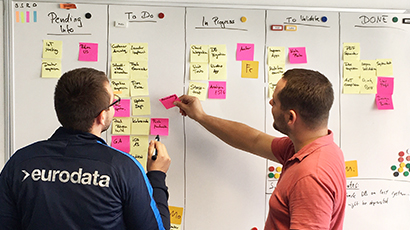eurodata develops the cloud solutions with which it leads the market in close communication with users
eurodata is among Germany’s hidden champions of the software industry. With more than 50 years of experience, the company has already made a name for itself in the IT sector: eurodata is the market leader in on-line payroll accounting and one of the leading providers of accounting and controlling systems for filling stations. When it comes to Industry 4.0, the company, based in Saarbrücken, can also boast a positive reputation, not least because of edbic, its platform for data and process integration.
This success is based on software development which is both solid and innovative at the same time. For five years, this has been the responsibility of Gerhard Wannemacher, who has been working at eurodata as a computer scientist since 1997. He is well familiar with the challenges thrown down by increasing digitalisation. When we interview him it becomes clear that, behind the technological and methodological competence of eurodata’s software team in these times of the cloud and virtual environments, a clear strategy and visionary strength are also important. Always keeping a step ahead so as to be able to meet requirements fast – an approach that has proved its worth.
Gerhard Wannemacher explains this success by the fact that from the very beginning it is the customer who has come to the fore in the definition of the developer’s task. To ensure a common language between users and developers, there is – ‘additionally’ – a specialist, who adapts the content of the tasks for development. This ensures that the software developers understand the users and can develop a good feel for their needs. The aim: to support customers in tackling their daily challenges more easily by constantly improving software solutions.
What sounds so simple now has in fact been quite a long trek: from an accounting service in the 60s to today’s modern software solutions. At the beginning, the users recorded the data manually, transferred them to the data centre and then usually received the results as a printout. With the customers looking for faster processing, eurodata got geared up appropriately and set itself the target of pouring the masses of complex data into a software with which, when all was said and done, users could carry out the processing themselves, without needing any specialist IT knowledge.
Wannemacher describes the special value of eurodata’s software development like this: “Just a few years ago, knowledge was power. Today, particularly in the area of software development, knowledge only means a certain degree of power. Teams work together cross-functionally, sharing ideas and pollinating one another with innovations in software architecture and process workflows in software development.”
Meanwhile, Wannemacher and his team use the SCRUM method to shorten development cycles and in order to be able to react more dynamically to market changes. Yet the developer does not see Scrum as a method, but rather as a framework in which various different processes and techniques can be deployed. As he sees it, Scrum renders the relative effectiveness of product management visible, so that the development process really can be improved. Obstacles can be identified better and faster and eliminated earlier on. That in turn has an impact on the team and its performance, and thus also on the product.
Not only that. In the eurodata Group an enterprise service bus system – edbic – is also being developed and used and installed in the development concepts. edbic provides optimum support for the integration of data and processes, makes procedures possible that cater to different kinds of system, and renders them easier to see and easier to control.
For these reasons, the software specialist feels fit for the future: “One major trend is digital collaboration. Today, via various channels, data and information are exchanged faster than ever before. In future, business applications will comprise even more collaboration functions.”
Gerhard Wannemacher goes on to say: “This high digitalisation will lead to even greater automation and improve the effectiveness of users yet again, because they benefit from the discontinuation of manual processes. Of course, that will also lead to a certain hunger for information. Everyone wants to receive information fast and be able to view that information from anywhere in the world. Order today, take delivery tomorrow, obtain information ad hoc. We’re already familiar with that in commerce today. In a few years, our users will be the so-called digital natives. What they expect from our business applications is speed and ease of use. We’re prepared for that.”
